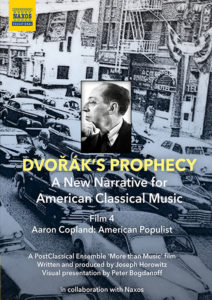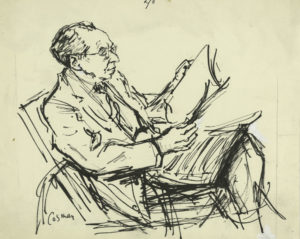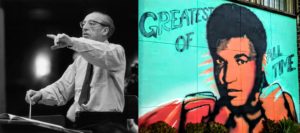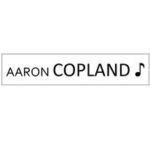
When I come across a new documentary or book about Copland what I yearn for is to find stones being lifted that normally aren’t and new nuggets of information being revealed. So I was absolutely delighted to find this new film which looks at Copland’s life from the 1930s to the 1950s.
Aaron Copland: American Populist (put together by PostClassical Ensemble and writer Joseph Horowitz on the Naxos label) in some ways is a bit of a misnomer as you might expect the main focus to be on Appalachian Spring and Rodeo but instead the film focusses Copland’s populist Americana around his score for the legendary documentry The City. This populism is juxtaposed with extracts of his most “popular” modernist work The Piano Variations (often considered a room emptier!) and his serial masterpiece The Piano Fantasy (which enjoys a similar reputation).
The main reason for The City being the centre piece is that the PostClassical Ensemble and their conductor Angel Gil-Ordonez were responsible for rerecording the soundtrack as part of the superb Naxos DVD recording released in 2009 (this was later also released on CD and for streaming – see this blog). However, Joseph Horowitz who is the main contributor throughout the film, does suggest that in his view it was Copland’s best movie soundtrack.
What’s really illuminating is the fact that so much of the film is about Copland’s leftist / Communist leanings in the 30s and his appearance in front of Joseph McCarthy and the House of UnAmerican Activities in 1953. A good chunk of the dialogue of the interrogation by McCarthy is voiced by actors and it’s riveting.
There’s also a rendition of Copland’s unpublished workers song Into the streets May 1st which Copland later described as the silliest thing he ever wrote.
The insights by all the contributors which include historians and musicians are really informative. I am particularly thankful for the introductions by Angel Gil-Ordonez. I spend a lot of my time trying to work out the orchestration of Copland pieces. There’s a bit at the end of New England Countryside which I have long admired and thought was a solo bassoon. It turns out that its an alto saxophone! Also, he mentions another passage which accompanies a lone worker returning home after a long day of work in the grey smoky steel town. This combines bassoon and cor anglais to accentuate the pathos.
 The reminiscences of Benjamin Pasternack about his meeting (when a young student) with Copland in 1980 are really interesting suggesting 100% geniality but at the same time giving 0% away about his private life or thoughts. Finally Horowitz assesses Copland compared with Charles Ives and George Gershwin. Horowitz describes these other greats as being composers who always did there own thing whereas as a lot of Copland’s work involved adding music to someone else’s idea. His description of Copland as a cork in the water is a fascinating view, one that I’m not sure I totally agree with but fascinating nonetheless.
The reminiscences of Benjamin Pasternack about his meeting (when a young student) with Copland in 1980 are really interesting suggesting 100% geniality but at the same time giving 0% away about his private life or thoughts. Finally Horowitz assesses Copland compared with Charles Ives and George Gershwin. Horowitz describes these other greats as being composers who always did there own thing whereas as a lot of Copland’s work involved adding music to someone else’s idea. His description of Copland as a cork in the water is a fascinating view, one that I’m not sure I totally agree with but fascinating nonetheless.
I suppose the only down side is that all the contributors are speaking into their webcams so it does have that feel of 2020 Covid Lockdown about it and I am sure we’re all a bit fed up of Zoom by now. All in all though this is a great way to spend an hour. Thanks PostClassical Ensemble and all the contributors for putting so much time and effort into making this!
You can buy the Aaron Copland: American Populist DVD or stream it here.









Leave a Comment